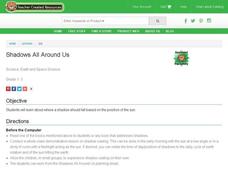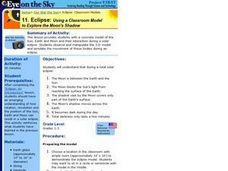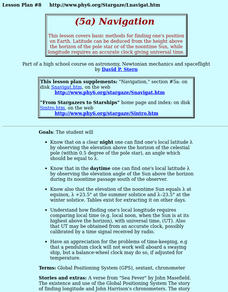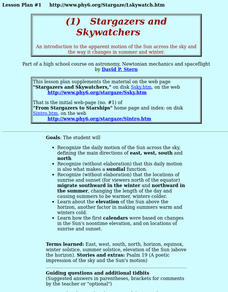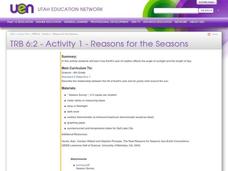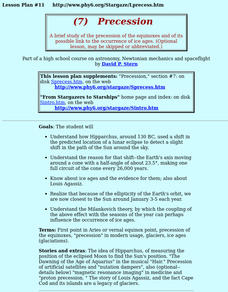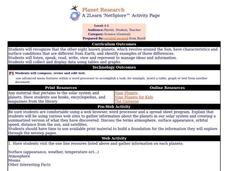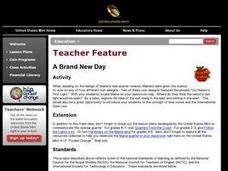Curated OER
Satellites and Solar Cells
In this satellite and solar cells worksheet, students determine the electrical power generated by the solar cells on the IMAGE satellite. Students solve 3 problems including finding the usable area of the satellite, determining the power...
Curated OER
Shadows All Around Us
Students create shadows. In this shadow casting activity, students read books about shadows, view a demonstration on shadow casting and then practice shadow casting on their own. Students cast a shadow using the position of the sun.
Curated OER
Eclipse: Using a Classroom Model to Explore the Moon's Shadow
Students manipulate and observe a 3-D model which simulates the activity of the Sun, Earth and Moon during a solar eclipse.
Curated OER
Large Numbers- the Planets
In this writing distances worksheet, students re-write the chart to show the distance each planet sits from the sun using words rather than numbers, all measurements are in km.
Curated OER
Planet Fact Sheet
In this space science worksheet, students record facts about one of the planets, which they draw in a box on the page. They write the name, distance from the sun, length of day and year, and number of moons. They describe how the planet...
Curated OER
Food Chains
Students create their own food chains on Kidspiration starting from the energy of the sun and what it creates. In this food chains lesson plan, students learn about how insects eat plants and so on.
Curated OER
Time
Students make a sundial. In this time activity, students determine the time of the day by creating a sundial. They check the time on the sundial, hourly, for one week. Afterward, they explore what happened to the shadows in reference to...
Curated OER
Rate of Photosynthesis
Young scholars investigate the rate of photosynthesis using elodea leaves. In this photosynthesis lesson plan, students place elodea in a test tube filled with water. They include baking soda and place the test tube under a lamp. Young...
Curated OER
GROWING PLANTS UNIT
Students predict outcomes of scientific experiment,.conduct a scientific experiment with control groups, and plant seeds to observe, measure, and compare growth across groups. They gather, record, analyze, and share data with other...
Curated OER
Satellite Technology
In this satellite technology worksheet, students read about Low Earth Orbit satellites and the frictional drag from the Earth's atmosphere that causes them to fall back towards the Earth. Students use given data of the years the...
Curated OER
Creative Position Word Center Activity
Students use positional words to describe the location of objects and demonstrate the ability to follow multi-step oral directions. Seasonal shapes are decorated in relation to the directions and positions stated by the positional word.
Curated OER
Navigation
Students study the basic methods for finding one's position on Earth. Latitude can be deduced from the height above the horizon of the pole star or of the noontime Sun, while longitude requires an accurate clock giving universal time.
Curated OER
Stargazers And Skywatchers
Learners recognize the daily motion of the Sun across the sky, defining the main directions of east, west, south and north. They see how the first calendars were based on changes in the Sun's noontime elevation, and on locations of...
Curated OER
Reasons for the Seasons
Sixth graders conduct and analyze a survey that explores public perceptions about the reasons for seasonal change. They measure the changing length of days, observe shadows and discuss how the Earth's axis of rotation affects the seasons.
Curated OER
Solar Flip Book
Students view and discuss various images of solar events. They research and create a flip book demonstrating the progression of two solar events, and write a poem describing their chosen solar event.
Curated OER
Sunspots 3: Tracking the Movement of Sunspots
Students analyze sunspots through the use of solar imaging from satellite instruments. They collect two types of images, and track the movement of sunspots using a latitude/longitude grid.
Curated OER
The Sunspot Cycle-Endings and Beginnings
In this sunspot cycle worksheet, students use a graph of the sunspot numbers from January of 1994 to January of 2008. Students solve 8 problems using the data in the graph to determine the maximum occurrence of sunspots, the minimum...
Curated OER
Sunspots or Lumpy Planets
Students examine the method Galileo used to prove sunspots were actually on the sun instead of objects between the Earth and Sun.. They study the term foreshortening and assess its relevance to observation.
Curated OER
A Galactic Fact Sheet
In this galactic fact worksheet, learners read through important facts about galaxies, their shapes, and distances from the Sun.
Curated OER
High School Mathematics Problems from Alaska: Writing an Equation: Altitude Range vs. Day in Barrow, Alaska
Students answer questions about the altitude range of the sun over time in Barrow, Alaska.
Curated OER
A Message in a Bottle
Students investigate the motion of water currents by mapping the possible movement of messages cast into the ocean in bottles.They accurately plot the appearance of bottles on a world map and illustrate the flow of an ocean current...
Curated OER
Precession
Students explain how Hipparchus, around 130 BC, used a shift in the predicted location of a lunar eclipse to detect a slight shift in the path of the Sun around the sky. They examine the elliptical orbit in which the Earth travels around...
Curated OER
Planet Research
Young scholars recognize that the other eight known planets, which revolve around the Sun, have characteristics and surface conditions that are different from Earth; and identify examples of those differences.
Curated OER
A Brand New Day
Pupils locate Maine on a classroom map and discuss if Maine is where the nation's first light is found, where would the nation's last light be seen. They explore the idea of the sun rising in the east and setting in the west.



